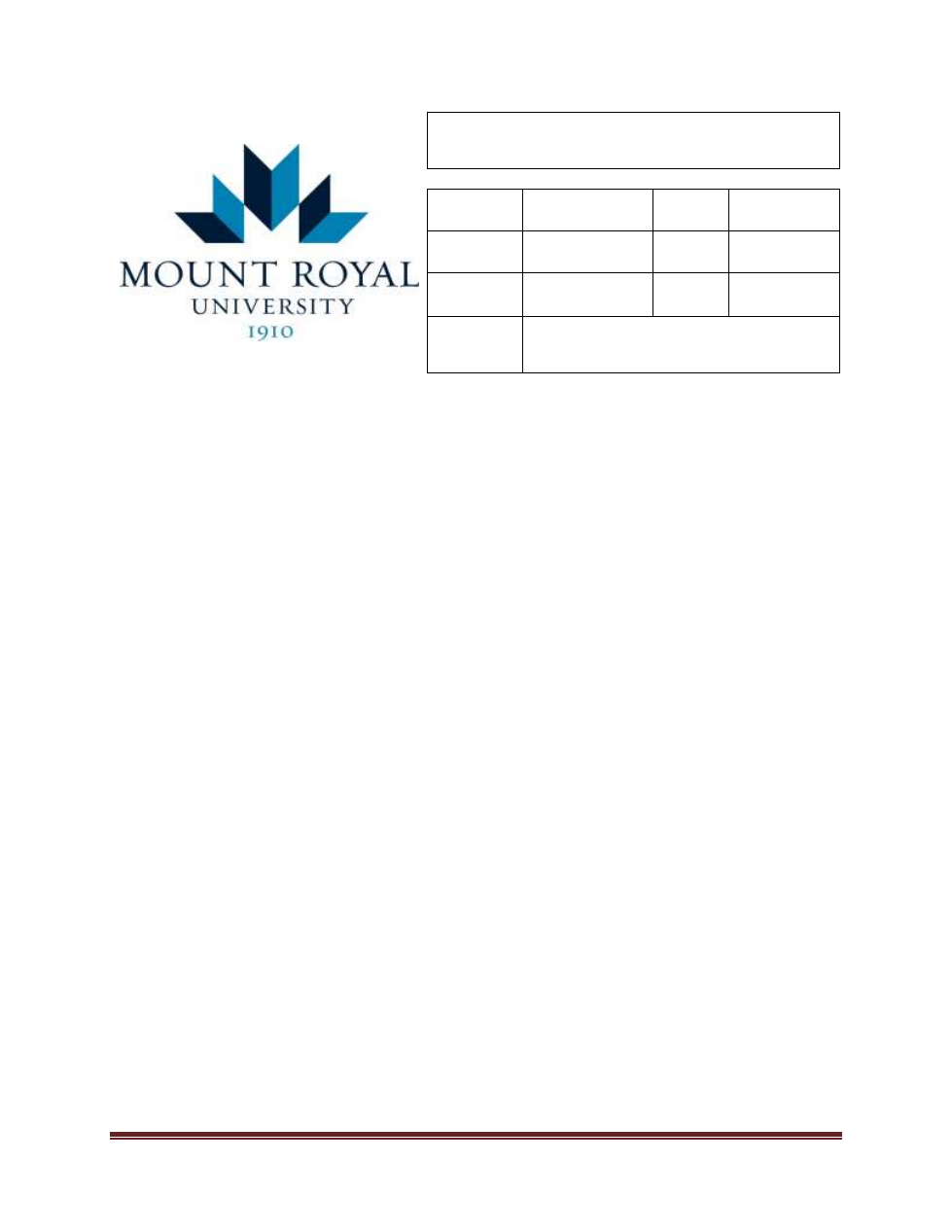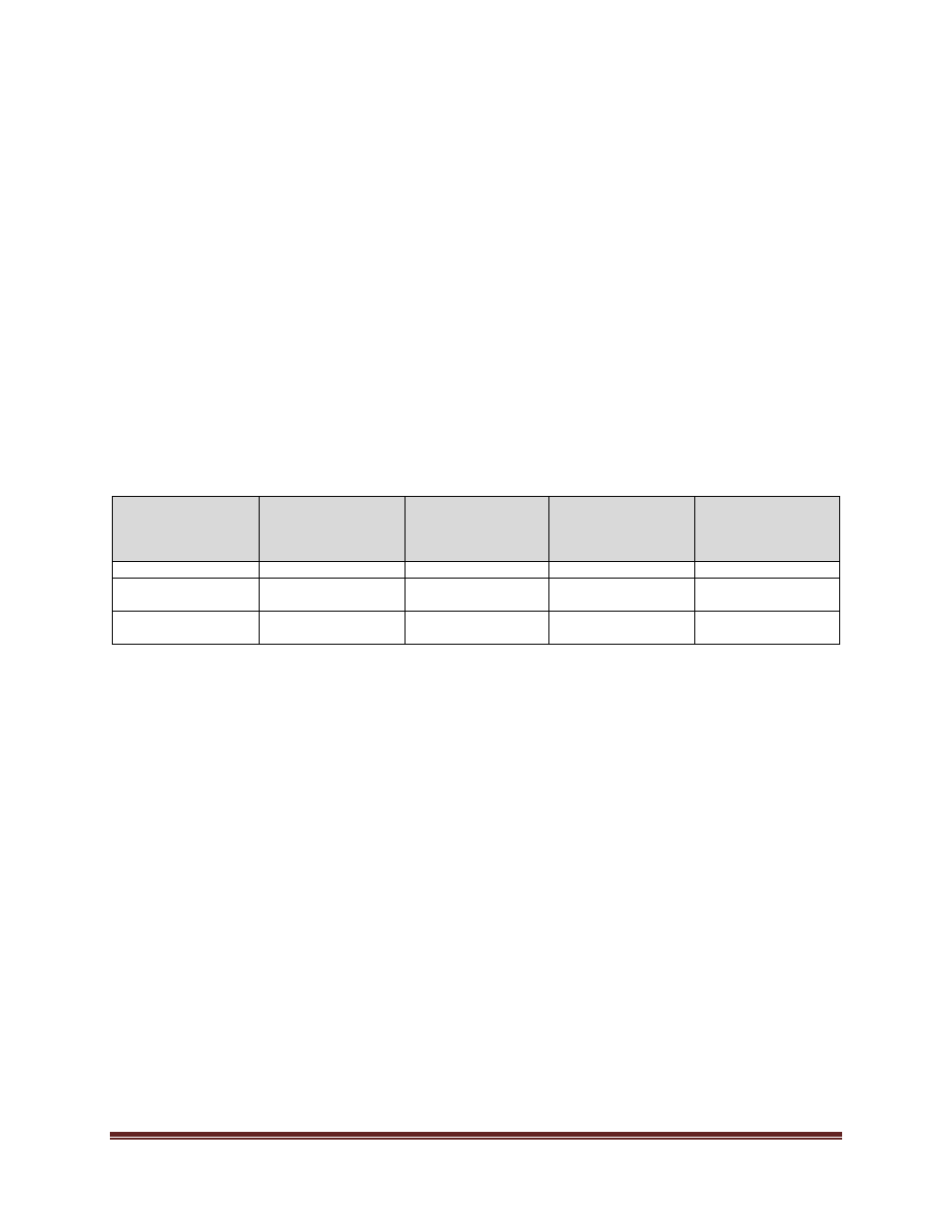
Purchasing Procedures – September 30, 2014
Page 1 of 9
PURCHASING PROCEDURES
Procedure
Type:
Management
Initially
Approved:
September 1,
2008
Procedure
Sponsor:
VP, Administrative
Services
Last
Revised:
September 30,
2014
Administrative
Responsibility:
AVP, Finance and
Commercial
Operations
Review
Scheduled:
May 2025
Approver:
Executive Leadership Team
A.
PROCEDURES
1.
SUPPLY CHAIN SERVICES RESPONSIBILITIES
1.1
The Supply Chain Services department is responsible for the management of all
purchasing activities on behalf of the University. Supply Chain Services has the
authority to design and manage purchasing programs, practices and procedures.
1.2
Operational departments may carry out purchasing initiatives for specific
commodities or low value items within the parameters of established procedures
or programs. Supply Chain Services retains the authority to change the
parameters of any procedures or programs to create operational efficiencies or
safeguard University resources.
2.
DEPARTMENTAL RESPONSIBILITIES
2.1
Budget Managers are responsible for the implementation of this Policy to the
extent they have been delegated authority as detailed in the Signing and
Contractual Commitment Authority Policy by the Board of Governors.
2.2
It is the responsibility of Budget Managers to share this document and all related
procedures and forms with all faculty/departmental personnel who are involved in
the purchasing process.
2.3
The requisitioning department shall be responsible for preparing functional and
technical specifications for the goods and services to be acquired. Due
consideration should be given to price, total life cycle cost, quality, delivery,
service, warranties, and other factors which may be relevant to the purchase.
2.4
Faculties and Departments have a responsibility to:
a.
Purchase from contracted or preferred vendors when those vendors are
able to meet the requirements of the goods or service being purchased.
b.
Utilize suppliers and service providers that have been awarded
institutional contracts as a result of tender or request for proposal
agreements.

Purchasing Procedures – September 30, 2014
Page 2 of 9
c.
follow the associated procedures to the Purchasing Policy, including the
Purchasing Card Procedures and the Sustainable Purchasing Guidelines.
3.
CODE OF ETHICS
3.1
University staff have a responsibility to maintain and practice the highest standards
of business ethics, professional competence, and courtesy with all procurements.
3.2
Supply Chain Services staff shall adhere to the code of ethics provided by the
Purchasing Management Association of Canada.
4.
APPROVAL AUTHORITY
4.1
Prior to initiating and/or authorizing any purchasing transaction, an employee must
have such authority delegated to them. Purchase requisitions must bear the
proper budgetary signature approvals as outlined in the Signing and Contractual
Commitment Authority Policy.
4.2
The purchase of computer and telecommunication equipment requires approval
as per the Purchase of Computer and Telecommunication Equipment Policy.
4.3
The purchase of software requires approval as per the Management of
Microcomputer Software Policy.
4.4
Any purchase (including the purchase of all furniture) that alters or re-purposes the
physical facilities or attaches to a building must have the approval of the Associate
Vice-President, Facilities Management or designate.
4.5
Supply Chain Services shall delegate the following authority to sign purchase
orders.
a.
Buyers up to a value of $25,000.
b.
Senior Buyers up to a value of $200,000.
c.
Director of Supply Chain Services for all purchase orders in excess of
$200,000.
5.
NON-APPLICATION
5.1
Certain items are excluded from this Policy.
5.2
Specific exclusions include:
a.
Library materials.
b.
Items purchased for resale at the BookStore.
c.
Internal purchases from other Mount Royal University departments (e.g.,
Document Services, Food Services, BookStore).
6.
COMPETITIVE PURCHASING METHODOLOGY
6.1
Goods and Services
a.
$1 - $4,999: Departments must utilize vendors that have been awarded
University contracts or purchase from preferred vendors. A listing of these

Purchasing Procedures – September 30, 2014
Page 3 of 9
vendors is found on the Supply Chain Services Intranet in MyMRU.
Purchases may be made with purchasing cards or purchase orders. The
requesting department is responsible for identifying competitive vendors
and should obtain three (3) verbal or written quotations prior to purchase.
Quotations for goods purchased repeatedly throughout a year may be
made on a periodic basis.
b.
$5,000 - $24,999: Purchase requisitions must be forwarded to Supply
Chain Services. The requesting department may provide advice in
regards to sourcing. At least three (3) quotations/ proposals should be
obtained by Supply Chain Services. Purchase is from the bidder providing
the best overall bid with respect to price and any other established
evaluation criteria. Purchases may be obtained through the use of a
Competitive Bid process as determined by Supply Chain Services.
c.
$25,000 - $74,999: In consultation with the requesting department, Supply
Chain Services must seek at least three (3) Competitive Bids. Suppliers
are awarded contracts based on the criteria outlined in each bid
opportunity.
d.
$75,000 or greater: In consultation with the requesting department,
Supply Chain Services must seek at least three (3) Competitive Bids. The
New West Partnership Trade Agreement requires the institution to post all
Competitive Bids for goods and services $75,000 or greater through an
electronic tendering system.
6.2
Construction
(Includes the purchase of Architectural or Engineering Services)
All construction and renovation projects must be coordinated through the Facilities
Management Department.
a.
$1 - $24,999: Facilities Management is responsible for sourcing and
making purchase decisions. At their discretion, Facilities Management
may request that Supply Chain Services manage a Competitive Bid
process. Purchases may be made from blanket orders established with
the contractor/trade, purchasing cards or purchase orders.
b.
$25,000 - $99,999: Facilities Management may solicit three (3) written
quotations from pre-qualified contractors or trades. Alternatively, Facilities
Management may request that Supply Chain Services manage a
Competitive Bid process for the purchase.
c.
$100,000 - $199,999: Opportunities must be managed through a
Competitive Bid process by Supply Chain Services. Contractors/ Trades
are awarded contracts based on the criteria outlined in each bid
opportunity.
d.
$200,000 or greater: Opportunities must be managed through a
Competitive Bid process by Supply Chain Services. Contractors/ Trades
are awarded contracts based on the criteria outlined in each bid
opportunity. The New West Partnership Trade Agreement requires the
institution to post all bids for construction $200,000 or greater on an
electronic tendering system.

Purchasing Procedures – September 30, 2014
Page 4 of 9
6.3
Project Team Initiatives
a.
The Project Manager of any team is responsible for compliance with the
Purchasing Policy and associated procedures. Should the project team
reasonably foresee a purchase being made, it is recommended that they
consult with Supply Chain Services.
b.
The participation of potential vendors/service providers in pre-purchase
activities (consultation, demonstrations, information sharing, etc.) shall not
provide them with any advantage in the procurement process.
c.
In these situations, Supply Chain Services will assist the Project Team
through the use of either a Competitive Bid process, an Advance Contract
Award Notice (through Alberta Purchasing Connection), or other open and
transparent purchasing process.
6.4
Circumstances for Exclusions
a.
By law, procurement processes must not be excluded for the purposes of
avoiding competition between suppliers or in order to discriminate against
suppliers within Alberta or within any other province.
b.
Procurements may be excluded from competition when any of the
following criteria apply:
i.
Where an unforeseeable situation of urgency exists and the
goods, services or construction cannot be obtained in time by
means of open procurement procedures.
ii.
Procurement of goods and services related to cultural or artistic
fields and computer software for educational purposes.
iii.
In the absence of receipt of any compliant bids in response to a
call for competitive bids.
iv.
Contracts between the University and another public body or a
non-profit organization.
v.
Procurement of goods, services and construction that is financed
primarily from donations that are subject to conditions that are
inconsistent with the Agreement on Internal Trade.
vi.
Where construction materials are to be purchased and it can be
demonstrated that transportation costs or technical considerations
impose geographic limits on the available supply base, specifically
in the case of gravel, asphalt or pre-mix concrete.
vii.
Procurement of services that may by legislation or regulation be
provided only by any of the following licensed professionals;
medical doctors, dentists, nurses, pharmacists, veterinarians,
engineers, land surveyors, architects, accountants, lawyers and
notaries.
viii.
Procurement of services of financial analysts or the management
of investments by organizations who have such functions as a
primary purpose.

Purchasing Procedures – September 30, 2014
Page 5 of 9
ix.
Procurement of financial services respecting the management of
financial assets and liabilities (i.e., treasury operations), including
ancillary advisory and information services, whether or not
delivered by a financial institution.
x.
Where compliance with open competitive bidding provisions
would interfere with the University’s ability to maintain security or
order or to protect human, animal or plant life or health.
xi.
Where a contract is to be awarded under a cooperation agreement
that is financed, in whole or in part, by an international cooperation
organization, only to the extent that the agreement between the
University and the organization includes rules for awarding
contracts that differ from the obligations set out in the Agreement
on Internal Trade.
xii.
Procurement of goods intended for resale to the public.
xiii.
Procurement from philanthropic institutions, prison labour or
persons with disabilities.
7.
SOLE AND PREFERRED SOURCE
7.1
The University is committed to purchasing goods and services in the marketplace.
Purchasing from a sole or preferred source is an exception and permission must
be received from Supply Chain Services.
7.2
The University recognizes that certain goods and services may be available from
only one source, or a vendor may be preferred due to the reasons listed below. In
these instances, the formal competitive bidding process is not practical and may
be precluded.
7.3
Purchase requisitions for sole or preferred source goods or services over $5,000
must be accompanied by a “Sole/Preferred Source Form” detailing the specifics of
the purchase that prevent utilizing the competitive bidding process.
7.4
Purchase requisitions for contractors identified as a sole or preferred source
(construction or renovation) and managed through Facilities Management for
projects over $25,000 must be accompanied by a “Sole/Preferred Source Form”
detailing the specifics of the purchase that prevent utilizing the competitive bid
process.
7.5
The Sole/Preferred Source Form must be submitted for the consideration and
approval to the Director of Supply Chain Services
prior to entering into the
transaction.
7.6
Sole or preferred source purchases may be made when one or more of the
following applies:
a.
To ensure compatibility with existing products, to recognize exclusive
rights, such as exclusive licenses, copy right and patent rights, or to

Purchasing Procedures – September 30, 2014
Page 6 of 9
maintain specialized products that must be maintained by the
manufacturer or its representative;
b.
Where there is an absence of competition for technical reasons and the
goods or services can be supplied only by a particular supplier and no
alternative or substitute exists;
c.
For the procurement of goods or services that supply of which is controlled
by a supplier that is a statutory monopoly;
d.
For the purchase of goods on a commodity market;
e.
For work to be performed on a leased building or portions thereof that may
be performed only by the lessor;
f.
For work to be performed on property by a contractor according to
provisions of a warranty or guarantee held in respect of the property or the
original work;
g.
For a contract to be awarded to the winner of a design contest;
h.
For the procurement of a prototype of a first good or service to be
developed in the course of and for a particular contract for research,
experiment, study or original development, but not for any subsequent
purchases;
i.
For the purchase of goods under exceptionally advantageous
circumstances such as bankruptcy or receivership, but not for routine
purchases;
j.
For the procurement of original works of art;
k.
For the procurement of subscriptions to newspapers, magazines or other
periodicals; or
l.
For the procurement of real property.
8.
PRE-QUALIFIED VENDORS
8.1
Supply Chain Services may develop a database of pre-qualified vendors for
providers of goods, services or construction. Additional vendors must be given the
opportunity to become a pre-qualified vendor at least once every five years.
9.
SUSTAINABILITY
9.1
Consideration will be given to products that are proven to have a less negative
impact on the environment than other products of the same or similar quality.
Where possible and practical, competitive bidding will consider environmental
impacts (see Sustainable Purchasing Guidelines).
10.
CONFIDENTIALITY
10.1
Vendor submissions, prices and purchase order information are to be considered
confidential information. University staff must not discuss or disclose such
information with other vendors. All inquiries for information regarding competitive

Purchasing Procedures – September 30, 2014
Page 7 of 9
bidding opportunities or the award or potential award of University business must
be referred to Supply Chain Services.
11.
CONFLICT OF INTEREST
11.1
A conflict of interest exists when in their normal course of duties an employee may
be in a position to make personal gains from an outside interest by their ability to
influence transactions. Employees should also be aware that there may be
instances in which a perception of conflict of interest may exist.
11.2
University employees with a direct or indirect interest in a University vendor, or
who may be perceived to have a direct or indirect interest in a University vendor
must report such interest to the Director of Supply Chain Services. For further
details in regards to conflict of interest, see the Conflict of Interest Policy.
12.
GIFTS AND GRATUITIES
12.1
In serving the interests of the University, no employee shall use his/her authority
of office for personal benefits. To preserve the image and integrity of both the
employee and the University, business gifts other than items of small intrinsic value
should not be accepted.
12.2
Reasonable hospitality is an accepted courtesy of a business relationship. The
frequency and nature of gifts and hospitality should not be allowed whereby the
recipient might be or might be deemed to have been influenced in making a
business decision as a consequence of accepting such hospitality or gifts.
13.
COMPLIANCE WITH LEGISLATED PURCHASING REQUIREMENTS
13.1
Purchasing practices will adhere to purchasing law and all legislated requirements
including, but not limited to the Agreement on Internal Trade and the New West
Partnership Trade Agreement.
14.
COOPERATIVE PURCHASING
14.1
The University may participate in joint purchasing, wherever feasible and practical,
with other public sector organizations.
15.
UNAUTHORIZED PURCHASES
15.1
Any purchase or commitment made in the name of the University without proper
authorization or not in accordance with these procedures will be considered an
obligation of the individual making the purchase. The University retains the right
to refuse payment for such purchases. This includes, but is not limited to
purchases of technology (computers), furniture and software licenses.
16.
DISPOSAL OF SURPLUS MATERIALS
16.1
Surplus and obsolete material(s) are the property of the University (not individual
departments), and as such should be disposed of in a manner that maximizes the
value that the University receives for the materials (see Capital Assets Policy).
17.
PERSONAL PURCHASES
17.1
The University will not purchase any goods or services for the personal use of
University employees or students.

Purchasing Procedures – September 30, 2014
Page 8 of 9
17.2
Central Receiving will not receive or ship personal items for University employees
or students. Personal items received at Central Receiving may be returned to the
shipper.
18.
LOCAL PREFERENCE
18.1
Local preference may only be permitted in certain circumstances when local
service or support is critical to operational needs; otherwise no preference shall be
provided to local suppliers of goods or services.
19.
RECEIVING OF GOODS
19.1
The responsibility for receipt of all goods is vested with Supply Chain Services.
Where possible and practical, all goods delivered to the University should be
received by Central Receiving. When it is not practical to deliver goods to Central
Receiving (i.e., large items installed on location), a member of the Receiving
Department must be notified by the user department.
19.2
In specific situations, arrangements may be made for direct delivery to the office
or classroom through a contractual arrangement with the vendor.
B.
DEFINITIONS
(1)
Budget Manager:
a Mount Royal University employee with delegated budget
authority for one or more Organizational Units
(2)
Competitive Bid:
a formal process managed by Supply Chain Services and may
include either a Request for Quotation, Request for Proposal or
Invitation to Tender
(3)
Contracted Vendor: a vendor which has an established contract with Mount Royal
University and there is a commitment to make purchase(s) from
the vendor
(4)
Organizational Unit: a department, faculty or like unit of ongoing operational activity
managed by a designated Budget Manager and generally
involving both staff and budgetary resources. Established
organizational units within Mount Royal are represented by a
distinct organizational code in the University’s enterprise
resource planning system.
(5)
Pre-Qualified
Vendor:
a vendor which has been identified by Mount Royal University’s
Supply Chain Services Department as being a suitable vendor
for a particular type of commodity or service
(6)
Preferred Vendor:
a vendor which has been identified by Mount Royal University’s
Supply Chain Services Department as being a suitable vendor
for a particular type of commodity or service
(7)
Policy:
means the Purchasing Policy
(8)
University:
means Mount Royal University

Purchasing Procedures – September 30, 2014
Page 9 of 9
C.
RELATED POLICIES
•
Capital Assets Policy (and related procedures)
•
Conflict of Interest Policy (and related procedures)
•
Hosting Expense Policy (and related procedures)
•
Management of Microcomputer Software Policy (and related procedures)
•
Contractual Signing Authority Policy (and related procedures)
•
Travel and Expense Policy (and related procedures)
D.
RELATED DOCUMENTS
Alberta Purchasing Connection Advance Contract Award Notice
Canada Revenue Agency Income Tax Bulletin, Employee Fringe Benefits
Purchasing Card Procedures
Sole/Preferred Source Form
Sustainable Purchasing Guidelines
E.
REVISION HISTORY
Date
(mm/dd/yyyy)
Description of
Change
Sections
Person who
Entered Revision
(Position Title)
Person who
Authorized
Revision
(Position Title)
09/01/2008
NEW
09/30/2014
Director, University
Secretariat
01/19/2022
Editorial
Policy Contact &
Related Policies
Policy Advisor
General Counsel &
University Secretary








